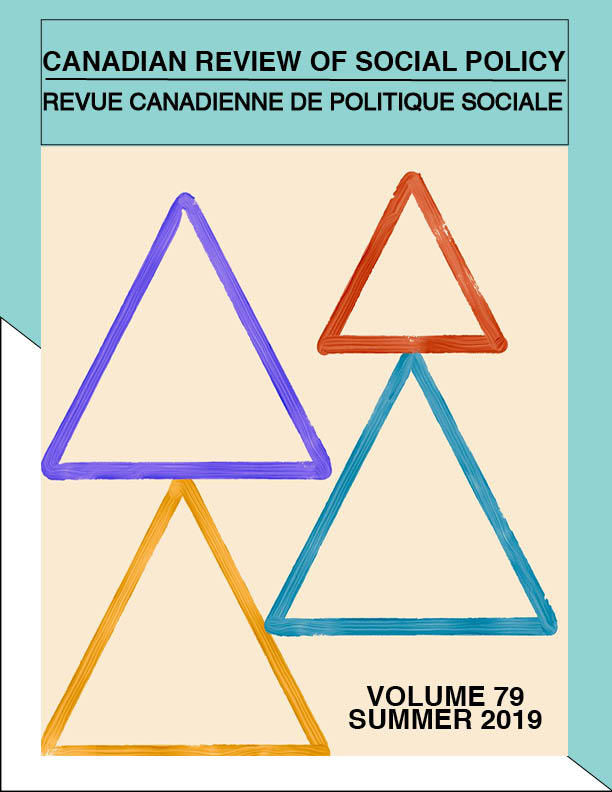A Critical Review of Research and Policy in Youth-Focussed Housing First
Mots-clés :
Youth, housing first, housing first for youth, literature reviewRésumé
The Housing First approach is a social policy directive for addressing homelessness, but there is a lack of clear evidence of its effectiveness with youth experiencing homelessness. At the community level, service providers are implementing “youth-focussed Housing First” without the research support to evaluate the efficacy of this approach in providing stable housing that promotes a positive transition to adulthood. This comprehensive literature review includes ten of the most widely used social services databases, confirming a deficit of diverse perspectives and research evidence such as evaluative studies and peer reviewed articles validating the Housing First approach with youth. A comprehensive review of grey literature was also completed to determine what is known about youth-focussed Housing First and the most significant gaps in research. This article sets out directions for future research and produces social policy recommendations for all levels of Canadian government that will support Housing First programs that meet the unique developmental needs of youth. At the grassroots level, communities are adapting the Housing First approach to youth; this needs to be recognized and supported by research that evaluates the impact these programs are having in the lives of young people in order to inform scalability efforts to work towards eradicating youth homelessness. The hope is that youth-focussed Housing First develops a robust discussion in academic research.
Résumé
L’approche Logement d’abord est une directive de politique sociale visant à lutter contre l’itinérance, cependant, son efficacité n’est pas clairement démontrée auprès des jeunes en situation d’itinérance. Au niveau communautaire, les fournisseurs de services mettent en œuvre un programme « Logement d’abord » pour les jeunes malgré le manque d’études pour évaluer l’efficacité de cette approche afin de fournir aux jeunes un logement stable qui favorise une transition positive vers l’âge adulte. Cet article de revue détaillé inclut dix des bases de données de services sociaux les plus utilisées, ce qui aide à confirmer le manque de perspectives variées et de données de recherche telles que des études d’évaluation et des articles examinés par des pairs afin de valider l’approche « Logement d’abord » pour les jeunes. Une analyse détaillée de la documentation parallèle a également été réalisée afin de déterminer ce que l’on sait des programmes Logement d’abord pour les jeunes et les principales lacunes de la recherche. Cet article conçoit les orientations des futures études et présente des recommandations de politique sociale à tous les niveaux du gouvernement canadien, qui soutiendront les programmes Logement d’abord afin de répondre aux besoins développementaux uniques des jeunes. Au niveau local, les communautés adaptent l’approche Logement d’abord aux jeunes. Cela doit être reconnu et soutenu par des études qui évaluent l’impact de ces programmes sur la vie des jeunes afin de guider les efforts d’extensibilité visant à éradiquer l’itinérance des jeunes. Le but est de susciter une discussion animée en matière de la recherche universitaire quant au programme Logement d’abord pour les jeunes
Mots clés: Jeunes; logement d’abord; logement d’abord pour les jeunes; article de revue
Téléchargements
Publié-e
Comment citer
Numéro
Rubrique
Licence
1-The author guarantees that the manuscript is an original work not published elsewhere in print or electronically in whole or in part, except in abstract form, that the author has the full power to make this contribution, and that the manuscript contains no matter libelous or otherwise unlawful or which invades the right of privacy or which infringes any proprietary right.
2-The author guarantees that the manuscript has not been previously published in print or electronically and that if the manuscript contains any tables, figures or images fully reproduced or closely adapted from previously published material, the author must obtain the necessary permission from the author/publisher holding the original copyright prior to publication in CRSP. The author may be required to produce evidence of permission granted to CRSP’s editors.
3-As a condition of publication in CRSP, the author assigns all copyright to CRSP, including but not limited to the right to publish, republish, and otherwise distribute this manuscript in print, electronic, or other formats. As CRSP is a non-profit interdisciplinary scholarly journal, the author will receive no royalty or other monetary compensation for the assignment set forth in this agreement.
For the purpose of full disclosure, CRSP will not normally use the content provided by the author in a commercial venture, but for the purpose of disseminating the author’s content to as many readers as possible. For distribution, third parties engaging in commercial activities may be contracted to distribute the content globally, and such parties may make a profit out of the author’s content in their normal course of business. CRSP will not pay the author or reimburse the author in any form based on such commercial activities because the conduct of such commercial activities is outside the control of CRSP.
Any future reference to or use of this published material by the authors must acknowledge CRSP as the original place of publication.
PERMISSION REQUEST/ARCHIVING
Permission is given to author(s) receiving funding via Tri-Council Agencies, the Canadian Institutes of Health Research (CIHR), the Natural Sciences and Engineering Research Council of Canada (NSERC) and the Social Sciences and Humanities Research Council (SSHRC), to make their publications freely available in an Open Access repository within the stated deadline by the Tri-Council Agencies (12 months following publication). Archiving of publication must be a manuscript copy bearing none of the CRSP headers, footers or any other distinguishing marks. No links to the article on the CRSP website is permitted.
Permission requests from third parties to reproduce articles in part or full in academic/educational publications can be directed to the managing editor of CRSP, and will not be unreasonably denied.

